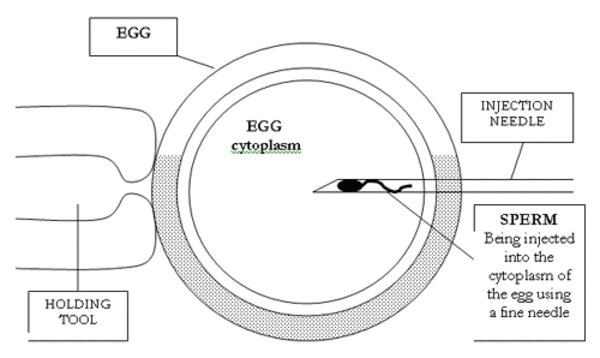ICSI
Female and Male Infertility Treatment in Wakad
Intracytoplasmic Sperm Injection (ICSI)
Another Female infertility treatment procedure is Intracytoplasmic sperm injection (ICSI). It is similar to the traditional IVF program, in this gametes (eggs and sperm) are collected from couples or individual partners. The only difference between ICSI and IVF is the method of fertilization. Dr. Nilesh Balkawade provides all sorts of Female infertility treatment in Wakad, he is also an expertise in Male infertility treatment.

ICSI process
In the ICSI procedure, a single sperm is picked up with a precise needle and directly injected into a mature egg (refer image). This procedure takes place in a lab by skilled and expert embryologists using special equipment.
In this procedure, very few sperms are required and the capability of the sperm to enter the egg is not that important, as the work has been already done by the ICSI technique.
Figure 1. Diagram illustrating the process of intracytoplasmic sperm injection (ICSI). The egg is held in place while a single sperm is injected into the cytoplasm of the egg using a very fine needle.
When is the ICSI procedure beneficial?
In ICSI procedure the sperm does not have to travel to the egg or enter the outer layers of the egg. Specialists recommend ICSI treatment if there is any obstacle in accomplishing fertilization due to male infertility factors. The factors include:
- Low sperm count
- Poor sperm motility
- The decreased capability of sperm to enter into the egg
- Previous unsuccessful IVF procedure
Dr. Nilesh Balkawade is also an expertise in Male infertility treatment in Wakad
How does ICSI work?
There are two ways that an egg may be fertilized by IVF: traditional and ICSI. In traditional IVF, 50,000 or more swimming sperm are placed next to the egg in a laboratory dish. Fertilization occurs when one of the sperm enters into the cytoplasm of the egg. In the ICSI process, a tiny needle, called a micropipette, is used to inject a single sperm into the center of the egg. With either traditional IVF or ICSI, once fertilization occurs, the fertilized egg (now called an embryo) grows in a laboratory for 1 to 5 days before it is transferred to the woman’s uterus (womb).
Will ICSI work?
ICSI fertilizes 50% to 80% of eggs. But the following problems may occur during or after the ICSI process:
- Some or all of the eggs may be damaged.
- The egg might not grow into an embryo even after it is injected with sperm.
- The embryo may stop growing.
Once fertilization takes place, a couple’s chance of giving birth to a single baby, twins, or triplets is the same if they have IVF with or without ICSI.
